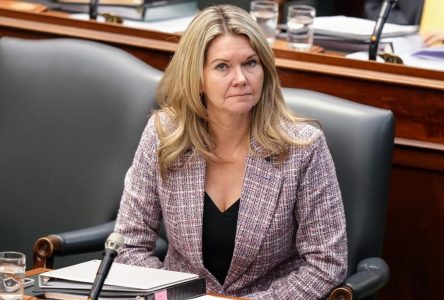TORONTO — Ontario reversed course Wednesday on its plan to dissolve the Region of Peel, citing concerns about tax hikes in an about-face that has come to typify the latter half of the year for Premier Doug Ford’s government, in particular on the housing file.
A transition board that has been working on the dissolution will instead focus on finding efficiencies in the upper-tier government located west of Toronto and improving regional services such as policing, paramedics and public health, the province said.
“The evidence we have seen is clear, full dissolution would disrupt critical services and lead to higher taxes for the people of Mississauga, Brampton and Caledon,” Housing Minister Paul Calandra said.
“And while some people might be OK with that, our government clearly is not.”
Calandra did not provide evidence or numbers to back up his claim. He said dissolution would also slow down housing builds.
“Not only would this be very costly to devolve into the three component parts, not only would it cost local rate payers significantly, but equally important, it would cause a level of uncertainty that would stop us from getting the shovels in the ground,” he said.
The government passed the Hazel McCallion Act in the spring to dissolve Peel Region, which is made up of Mississauga, Brampton and Caledon. The act fulfilled a promise Premier Doug Ford made to the former longtime mayor of Mississauga that it would stand as an independent city.
Outgoing Mississauga Mayor Bonnie Crombie, who is set to resign next month after being elected leader of the Ontario Liberal party, said she hopes the decision to reverse the dissolution was not only informed by a Deloitte report Brampton Mayor Patrick Brown recently cited.
“I will continue to call on the province to provide us with a credible, independent report commissioned by the transition board that proves Mayor Brown’s unfounded reports that taxes will skyrocket in Brampton and Caledon as a result of dissolution,” she said.
Brown has said that report shows dissolution would lead to an extra $1.3 billion in operating costs over 10 years and sharp increases in taxes on local residents.
Brown said Brampton analyzed the data and presented findings to the transition board, whereas Mississauga had none.
“It is bewildering that Mayor Crombie would challenge…(the) reports when she has not put forward any financial analysis to support her position this would (lead to) savings,” he said.
“I think she just hasn’t been involved, so she’s not aware. She has been largely absent for the last six months.”
Mississauga’s city manager said she has been at all of the transition board’s meetings and it has not yet done financial modelling on the full dissolution of Peel Region.
The move on Peel was the latest reversal for Calandra, who has been walking back a number of big government initiatives since he took over the housing portfolio in September after his predecessor resigned amid the Greenbelt scandal.
Removing land from the protected Greenbelt, a move that is being investigated by the RCMP, was reversed by the government earlier this year, as were forced urban boundary expansions.
The new mandate for the Peel transition board asks it to bring forward recommendations to remove the “duplicative layer of regional bureaucracy” to help build housing faster,” Calandra said.
The transition board will also look to “optimize services that will help build more homes, including land use planning, servicing roads and waste management,” he said.
NDP Leader Marit Stiles said the government should have crunched the numbers before it introduced legislation. Ford’s reversals have become a pattern, she said.
“Just like every other bill, they’re now going to have to introduce a bill to repeal said bill,” Stiles said.
“The province of Ontario is not a circus, right? We need, we deserve good government. We deserve responsible government. We deserve government that actually has the best interest of Ontarians at heart and not silly games.”
Ontario is also cancelling audits of six municipalities launched earlier this year to determine whether local governments are facing a revenue shortfall as a result of a provincial law that cuts some of the fees developers pay.
Municipalities use the money from those fees to fund housing-enabling infrastructure, and the Association of Municipalities of Ontario has said the provincial changes will leave those communities $5 billion short.
The former municipal affairs and housing minister had contended that municipalities were sitting on billions of dollars in reserve funds and launched those audits with a promise to make them “whole” if there was indeed a shortfall.
Instead, the province will now consult with municipalities on the impacts of the provincial law, Calandra said.
The first phase of the audits was largely complete, according to some of the municipalities involved, and Crombie urged the government to release the reports. The Progressive Conservative government previously commissioned a regional governance review in 2019, but has never released the results, going so far as to deny freedom-of-information requests for it.
Cam Guthrie, mayor of Guelph and the past chair of the Ontario Big City Mayors group, said the development charge policy is already leaving holes in municipal budgets, such as his own, forcing some cities to raise taxes to compensate. He believes the consultations Calandra announced Wednesday will be positive and truly make municipalities “whole,” but they need to happen quickly, he said.
“For the first time, I’m very, very hopeful to see this be resolved for, ultimately, a win on every level — a win on the relationship and collaboration side, a win on the impacts to local taxpayers, and an impact on getting the houses built,” he said in an interview.
Calandra also said he is considering revoking or amending several Minister’s Zoning Orders, which override local bylaws, for lack of action or lack of water or wastewater servicing for sites.
As well, the government said that measures it introduced earlier to spur the creation of “attainable” homes will be amended to incentivize the development of modular homes.
This report by The Canadian Press was first published Dec. 13, 2023.




